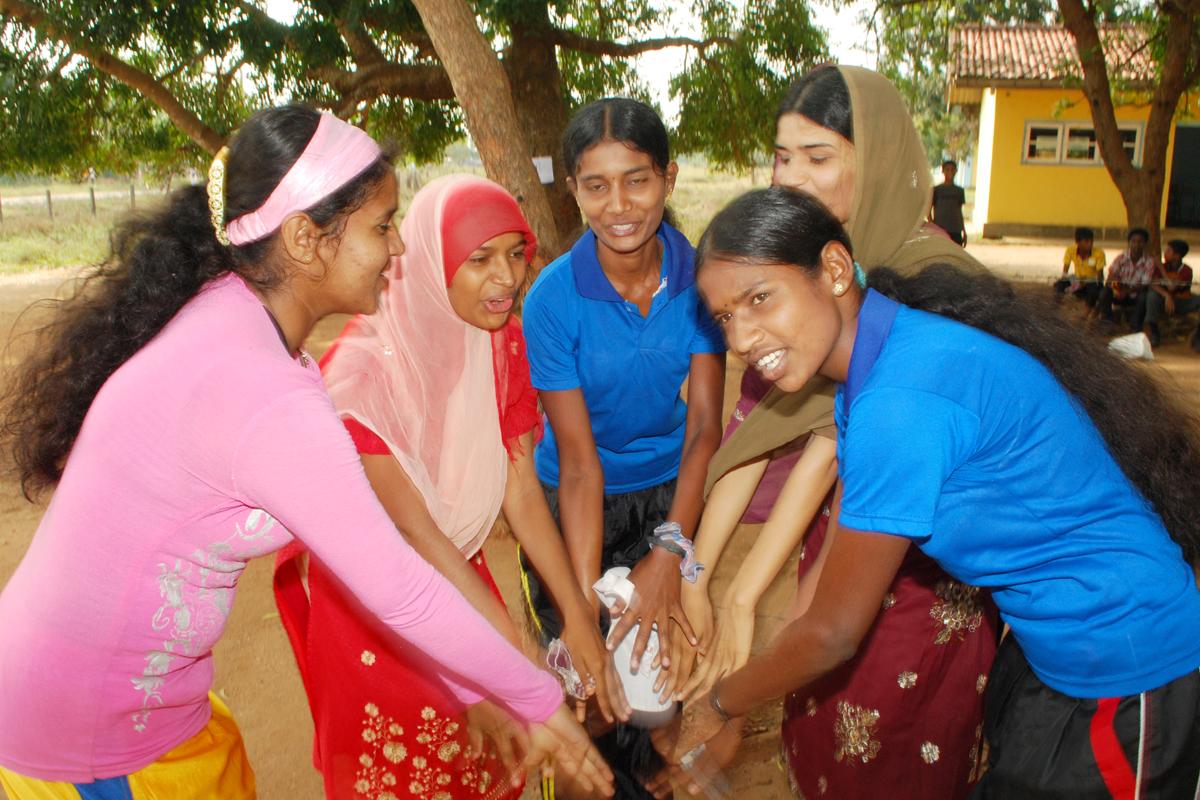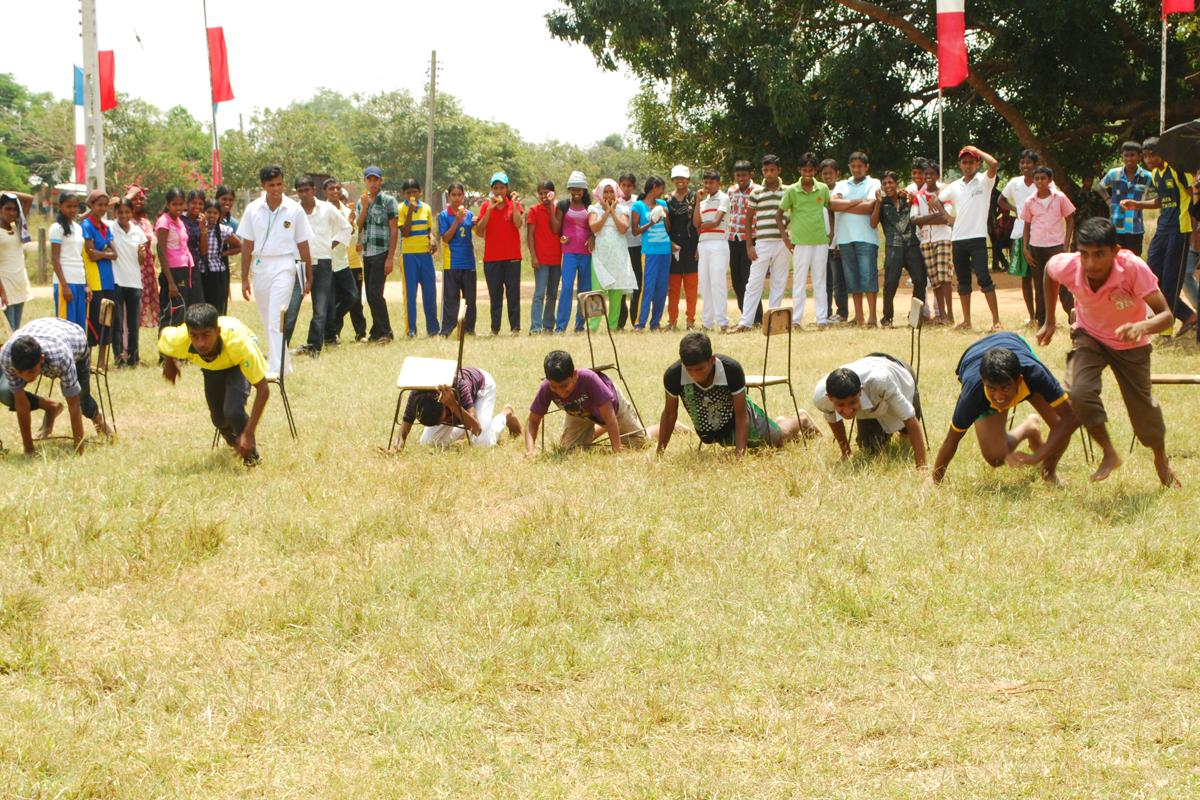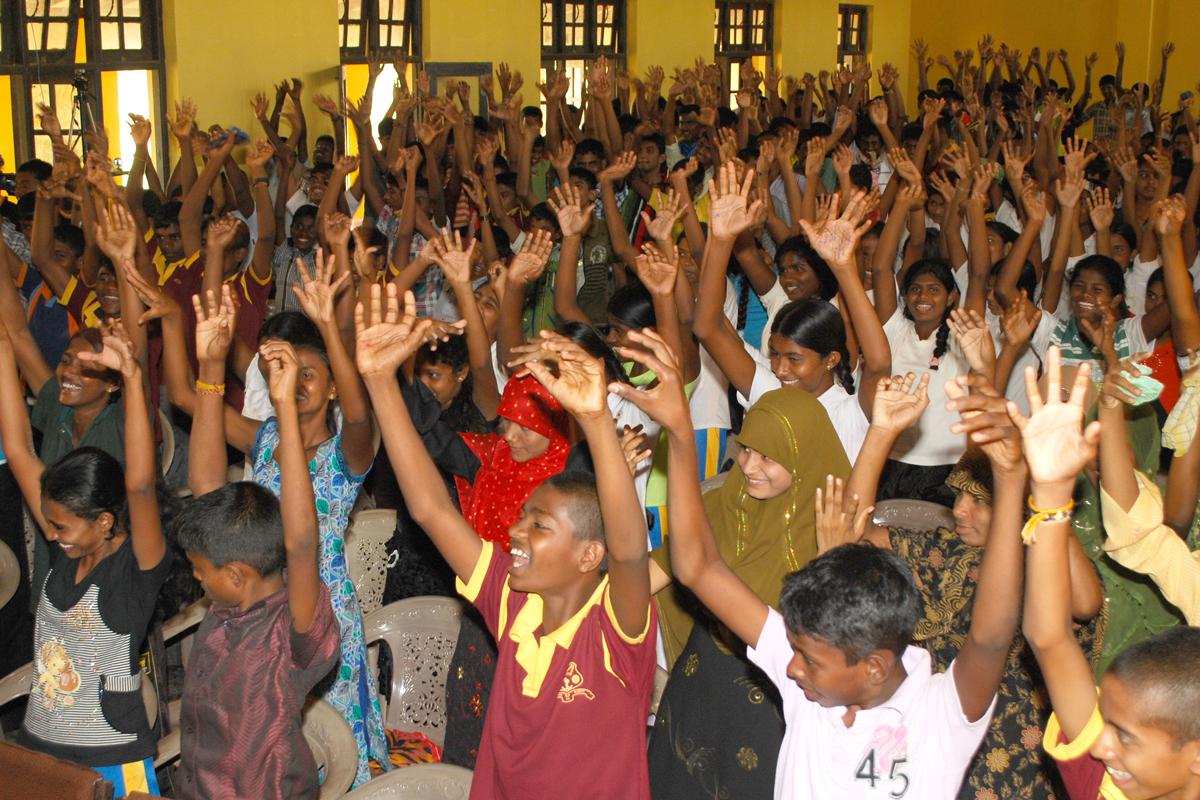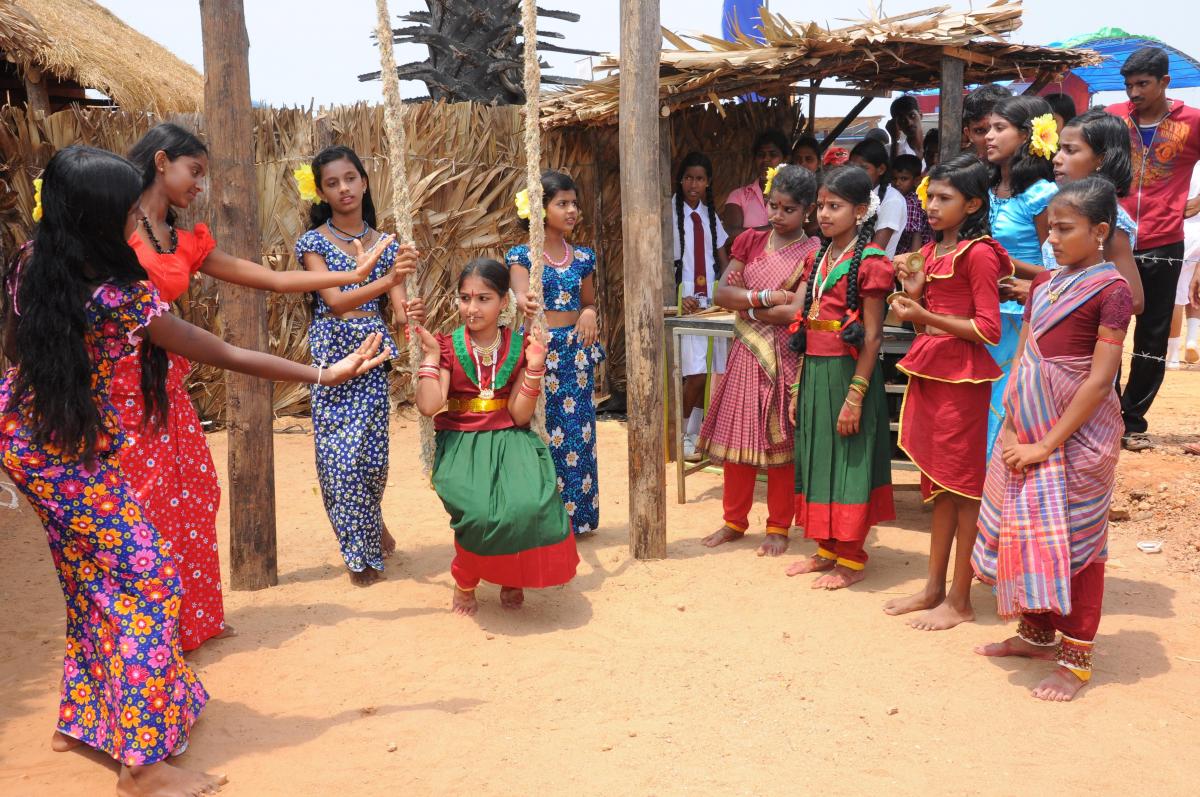      |
|
Contact us at: sooddram@gmail.com |
Students Courage: Reconciliation for Sustainable Peace
(By Nipunika
O. Lecamwasam )
It’s been three years since the
Liberation Tigers of Tamil Elam (LTTE) has been militarily defeated and the
three decade old armed conflict has officially come to an end. Since then
‘reconciliation’ has become the key operative word in socio-political
discourses in post war Sri Lanka. It is today the main apprehension of both
state and non state actors operating in the island. While there is no ideal
strategy that could be employed in bridging deep ethnic divides, it is
important to understand that every action taken in the name of reconciliation
today will bear significance in the future and therefore gearing reconciliation
has become a tricky subject. Most actors involved in reconciliation attempts focus
on a societal transformation that concerns the political aspect of change. Much
neglected is individual transformation which is crucial in sustaining peace in
its truest sense.
The writer by no means
underestimates the importance of a political solution in reconciliation, but
insists that no solution will be viable without the support of the people
concerned. Be it a proposal for a unitary state or a bid for
self-determination, it has to be supported by the people whose lives it will
affect. The sole stimulant of societal inspiration to make genuine efforts
towards reconciliation is the presence of a significant number of individuals
who crave it.
This article intends to bring into
light one such commendable attempt of lining up a critical mass who would
champion the cause of reconciliation.
Nena Guna Weduma:
Sisu Diriya National Programme, conducted by
the Office of Director (Social Development Affairs) to the President of Sri
Lanka was launched in 2006 in Northern and Eastern Provinces and has been in
operation since then. Since the end of the armed struggle in 2009, the programme became part of the country’s massive
reconciliation attempt but with a different outlook than most of its
contemporary counterparts. The project aims to establish ethno-religious
harmony based on a fundamental sharing of a collective identity that is
attained through an attitudinal change that cuts across ethnic and religious
barriers.

Students of different ethnicities
celebrating the beauty of unity
According to Mr. Nandana
Wijesinghe, Director, Social Development Affairs to
the President, the project incorporates a variety of methods ranging from Art
Exhibitions to Dance Performances, Medical and Counseling Camps to Skills
Training workshops in order to empower individuals and communities at grass
root level.
The project in its quest to foster
sustainable reconciliation especially focuses on Advanced Level students who
are on the threshold of adulthood. The young mind has enough innocence to have
faith in an ideally harmonious world – as opposed to adults – and enough
intellectual stamina to take concrete steps towards that end – as opposed to
children – and hence the youth comprise the perfect target group for any
reconciliation attempt. Therefore the youth is intended to be used as an agent
of change through communicating positive messages of love and kinship, the
greatest heritage of our ancestors who harmoniously co-existed since time
immemorial. Mr. Wijesinghe further states that apart
from moulding a generation of youth committed to
peace and social development, the project aims to identify youth who require
economic assistance and intends assisting them by creating a dialog to voice
out their grievances between them and the rulers.
The project covers the educational
zones in North and East and is laying the foundation for the emergence of a
strong civil society consisting of empowered individuals and communities. In
order to achieve this end, the programme employs an
assortment of schemes at individual, school, local community, district and
national levels.
A remarkable feature of the programme is its regard of individuals as subjects rather
than objects of peace and reconciliation. Deviating from the traditional method
of centralized decision-making, Sisu Diriya provides its beneficiaries with an opportunity to
air their opinions regarding social transformation and effectively contribute
to determining the course of the programme.
Another noteworthy point is the
project’s genuine effort towards re-humanizing the war affected mindset of the
population of North and East that was continuously and systematically
de-humanized by the many harmful and depressing consequences of war. The
project therefore aims to place these people in the focal point of its efforts
and to empower and make them subjects of peace rather than objects. As Mr. Wijesinghe believes empowerment does not mean the mere
handing over of power to people. Rather, it means enhancing the power that is
inherent in every human being in a way that makes them capable of actually
using it by joining hands for a greater cause of social benefit.

Students participating in sports and
recreational activities at the recently concluded Sisu
Diriya Programme in Mullativu and Welioya.
Sisu Diriya therefore has wisely
understood the importance of a bottom-up approach in slimming down the social
divide that infected the country for decades and has utilized social capital
for the realization of lasting peace in Sri Lanka. An approximate definition of
social capital is that it is the collectivity of mutually beneficial qualities
such as trust, reciprocity and networking present in relations between two or
more individuals. Though these qualities are inherent in human nature, social
capital is not a natural phenomenon of human social behaviour.
It is rather a deliberate effort that aims at transforming these qualities into
an aggregate that has reciprocal benefits.
As pointed before the target group
of Nena Guna Weduma consists of students who have lived in ordeal for
nearly three decades due to the war. Their consciousness is thus conditioned by
fear and suspicion. The organizers of the project are mindful of this issue and
therefore all programmes carried out under Nena Guna Weduma
involve a note of religiosity in which student participants are exposed to
other religions and cultures and are taught to respect each other’s faiths.
Mutual visits to different religious institutions are organized in attaining
this end. This is a constructive purposeful intervention in generating bridging
social capital that is positive relations across different groups which in this
case comprise of ethnicities and religions.
Different workshops that cover a
wide variety of subjects ranging from skill development to information
technology, health and beauty are important in the sense that these provide
students from different backgrounds the opportunity to meet and form relations
that in turn expose them to cultures they were previously alien to. This
exposure is essential in building trust which is a fundamental requisite of a
lasting peace.

Hopes for a brighter tomorrow
Beneficiaries of the project are
also annually given a chance to showcase their talents on ‘Deyata
Kirula’ stage, an opportunity that opens many avenues
for them. Apart from the obvious and immediate benefit of being provided with a
wide and appreciative audience, these students have also got job prospects by
displaying their talents.
Sisu Diriya has therefore been
successful in setting actual reconciliation in motion. It has taken up upon
itself the crucial task of moulding a future
generation devoid of ethnic hatred which is needed for a lasting peace. The
project wisely has focused on changing the war affected mindset of the wartime
victims of North and East to that of a peace loving, compassionate one.
The victims of war are those who
most fiercely oppose violence and would resist a relapse to it at any cost
owing to their personal encounters with same. Sisu Diriya correctly understanding this aspect has embarked on
a positive venture in inspiring future generations to reconcile when the need
for it is felt more than ever before. Mr. Wijesinghe
expects to expand the project to other parts of the country as well since
reconciliation is not limited to North and East only.
Since the bleak past is not the best
motivation for reconciliation in the country, it is important to be part of a
bottom up solution such as this because it focuses on a future built on solid
action taken at present.

- Asian Tribune -
உனக்கு
நாடு இல்லை என்றவனைவிட
நமக்கு நாடே இல்லை
என்றவனால்தான்
நான் எனது நாட்டை
விட்டு விரட்டப்பட்டேன்.......

ராஜினி
திரணகம
MBBS(Srilanka)
Phd(Liverpool,
UK)
'அதிர்ச்சி
ஏற்படுத்தும்
சாமர்த்தியம்
விடுதலைப்புலிகளின்
வலிமை மிகுந்த
ஆயுதமாகும்.’ விடுதலைப்புலிகளுடன்
நட்பு பூணுவது
என்பது வினோதமான
சுய தம்பட்டம்
அடிக்கும் விவகாரமே.
விடுதலைப்புலிகளின்
அழைப்பிற்கு உடனே
செவிமடுத்து, மாதக்கணக்கில்
அவர்களின் குழுக்களில்
இருந்து ஆலோசனை
வழங்கி, கடிதங்கள்
வரைந்து, கூட்டங்களில்
பேசித்திரிந்து,
அவர்களுக்கு அடிவருடிகளாக
இருந்தவர்கள்மீது
கூட சூசகமான எச்சரிக்கைகள்,
காலப்போக்கில்
அவர்கள்மீது சந்தேகம்
கொண்டு விடப்பட்டன.........'
(முறிந்த
பனை நூலில் இருந்து)
(இந்
நூலை எழுதிய ராஜினி
திரணகம விடுதலைப்
புலிகளின் புலனாய்வுப்
பிரிவின் முக்கிய
உறுப்பினரான பொஸ்கோ
என்பவரால் 21-9-1989 அன்று
யாழ் பல்கலைக்கழக
வாசலில் வைத்து
சுட்டு கொல்லப்பட்டார்)
Its
capacity to shock was one of the L.T.T.E. smost potent weapons. Friendship with
the L.T.T.E. was a strange and
self-flattering affair.In the course of the coming days dire hints were dropped
for the benefit of several old friends who had for months sat on committees,
given advice, drafted latters, addressed meetings and had placed themselves at
the L.T.T.E.’s beck and call.
From: Broken Palmyra
வடபுலத்
தலமையின் வடஅமெரிக்க
விஜயம்
(சாகரன்)
புலிகளின்
முக்கிய புள்ளி
ஒருவரின் வாக்கு
மூலம்
பிரபாகரனுடன் இறுதி வரை இருந்து முள்ளிவாய்கால் இறுதி சங்காரத்தில் தப்பியவரின் வாக்குமூலம்
திமுக, அதிமுக, தமிழக மக்கள் இவர்களில் வெல்லப் போவது யார்?
(சாகரன்)
தங்கி நிற்க தனி மரம் தேவை! தோப்பு அல்ல!!
(சாகரன்)
(சாகரன்)
வெல்லப்போவது
யார்.....? பாராளுமன்றத்
தேர்தல் 2010
(சாகரன்)
பாராளுமன்றத்
தேர்தல் 2010
தேர்தல்
விஞ்ஞாபனம் - பத்மநாபா
ஈழமக்கள் புரட்சிகர
விடுதலை முன்னணி
1990
முதல் 2009 வரை அட்டைகளின்
(புலிகளின்) ஆட்சியில்......
(fpNwrpad;> ehthe;Jiw)
சமரனின்
ஒரு கைதியின் வரலாறு
'ஆயுதங்கள்
மேல் காதல் கொண்ட
மனநோயாளிகள்.'
வெகு விரைவில்...
மீசை
வைச்ச சிங்களவனும்
ஆசை வைச்ச தமிழனும்
(சாகரன்)
இலங்கையில்
'இராணுவ'
ஆட்சி வேண்டி நிற்கும்
மேற்குலகம், துணை செய்யக்
காத்திருக்கும்;
சரத் பொன்சேகா
கூட்டம்
(சாகரன்)
எமது தெரிவு
எவ்வாறு அமைய வேண்டும்?
பத்மநாபா
ஈபிஆர்எல்எவ்
ஜனாதிபதித்
தேர்தல்
ஆணை இட்ட
அதிபர் 'கை', வேட்டு
வைத்த ஜெனரல்
'துப்பாக்கி' ..... யார் வெல்வார்கள்?
(சாகரன்)
சம்பந்தரே!
உங்களிடம் சில
சந்தேகங்கள்
(சேகர்)
(m. tujuh[g;ngUkhs;)
தொடரும்
60 வருடகால காட்டிக்
கொடுப்பு
ஜனாதிபதித்
தேர்தலில் தமிழ்
மக்கள் பாடம் புகட்டுவார்களா?
(சாகரன்)
ஜனவரி இருபத்தாறு!
விரும்பியோ
விரும்பாமலோ இரு
கட்சிகளுக்குள்
ஒன்றை தமிழ் பேசும்
மக்கள் தேர்ந்தெடுக்க
வேண்டும்.....?
(மோகன்)
2009 விடைபெறுகின்றது!
2010 வரவேற்கின்றது!!
'ஈழத் தமிழ்
பேசும் மக்கள்
மத்தியில் பாசிசத்தின்
உதிர்வும், ஜனநாயகத்தின்
எழுச்சியும்'
(சாகரன்)
மகிந்த ராஜபக்ஷ
& சரத் பொன்சேகா.
(யஹியா
வாஸித்)
கூத்தமைப்பு
கூத்தாடிகளும்
மாற்று தமிழ் அரசியல்
தலைமைகளும்!
(சதா. ஜீ.)
தமிழ்
பேசும் மக்களின்
புதிய அரசியல்
தலைமை
மீண்டும்
திரும்பும் 35 வருடகால
அரசியல் சுழற்சி!
தமிழ் பேசும் மக்களுக்கு
விடிவு கிட்டுமா?
(சாகரன்)
கப்பலோட்டிய
தமிழனும், அகதி
(கப்பல்) தமிழனும்
(சாகரன்)
சூரிச்
மகாநாடு
(பூட்டிய)
இருட்டு அறையில்
கறுப்பு பூனையை
தேடும் முயற்சி
(சாகரன்)
பிரிவோம்!
சந்திப்போம்!!
மீண்டும் சந்திப்போம்!
பிரிவோம்!!
(மோகன்)
தமிழ்
தேசிய கூட்டமைப்புடன்
உறவு
பாம்புக்கு
பால் வார்க்கும்
பழிச் செயல்
(சாகரன்)
இலங்கை
அரசின் முதல் கோணல்
முற்றும் கோணலாக
மாறும் அபாயம்
(சாகரன்)
ஈழ விடுலைப்
போராட்டமும், ஊடகத்துறை
தர்மமும்
(சாகரன்)
(அ.வரதராஜப்பெருமாள்)
மலையகம்
தந்த பாடம்
வடக்கு
கிழக்கு மக்கள்
கற்றுக்கொள்வார்களா?
(சாகரன்)
ஒரு பிரளயம்
கடந்து ஒரு யுகம்
முடிந்தது போல்
சம்பவங்கள் நடந்து
முடிந்துள்ளன.!
(அ.வரதராஜப்பெருமாள்)
அமைதி சமாதானம் ஜனநாயகம்
www.sooddram.com